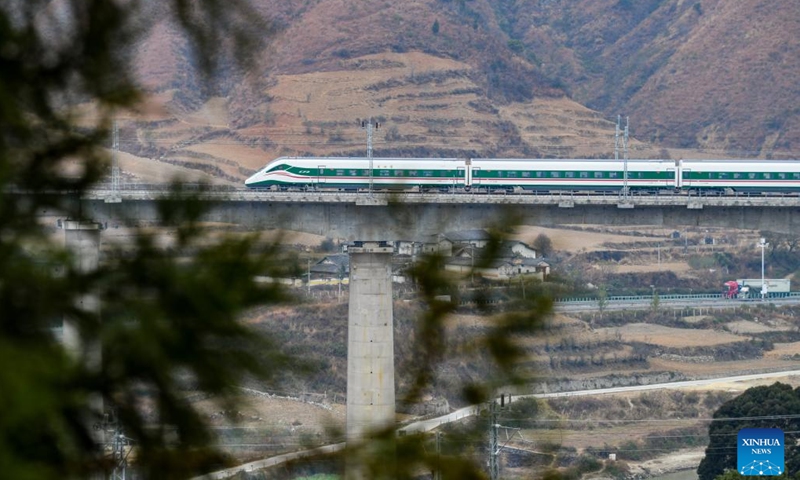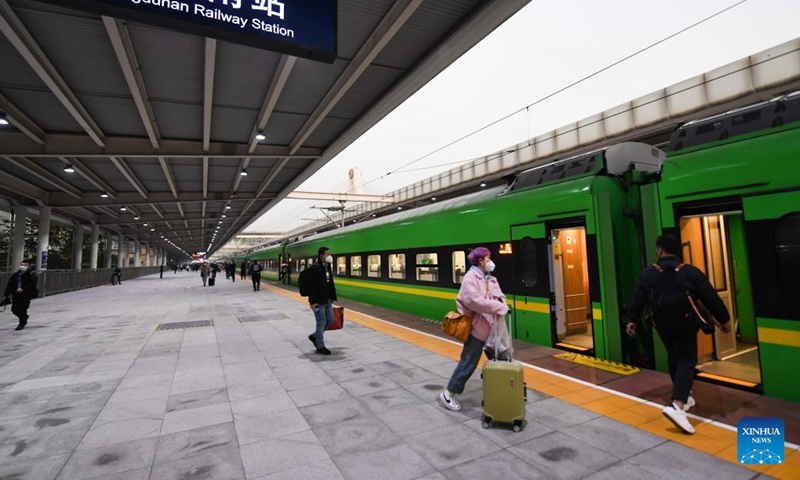
A Fuxing high-speed train makes a trial run before the opening of the new Chengdu-Kunming Railway in Mianning County, southwest China's Sichuan Province, Dec. 24, 2022. A railway linking Chengdu and Kunming, two major cities in southwest China, is now fully operational with the opening of its last section on Monday.(Photo: Xinhua)

People of Yi ethnic group pose for a group photo before the departing of a Fuxing bullet train coded C57 on the new Chengdu-Kunming Railway at Chengdu South Railway Station in Chengdu, southwest China's Sichuan Province, Dec. 26, 2022. A railway linking Chengdu and Kunming, two major cities in southwest China, is now fully operational with the opening of its last section on Monday.(Photo: Xinhua)

People of Yi ethnic group perform on a Fuxing bullet train coded C57 running on the new Chengdu-Kunming Railway in southwest China, Dec. 26, 2022. A railway linking Chengdu and Kunming, two major cities in southwest China, is now fully operational with the opening of its last section on Monday.(Photo: Xinhua)

Passengers board a Fuxing bullet train coded C57 on the new Chengdu-Kunming Railway at Chengdu South Railway Station in Chengdu, southwest China's Sichuan Province, Dec. 26, 2022. A railway linking Chengdu and Kunming, two major cities in southwest China, is now fully operational with the opening of its last section on Monday.(Photo: Xinhua)
A railway linking Chengdu and Kunming, two major cities in southwest China, is now fully operational with the opening of its last section on Monday.
With a designed speed of 160 km per hour, the new 915-km line, which runs almost parallel to an existing railway link between Chengdu and Kunming, cuts the travel time from 19 hours to 7.5 hours.
The new line runs through a number of cities and prefectures, such as Chengdu, Meishan, Leshan, Liangshan Yi Autonomous Prefecture and Panzhihua in Sichuan Province, and Chuxiong Yi Autonomous Prefecture and Kunming in Yunnan Province.
At 8:05 a.m. Monday, a Fuxing bullet train coded C57 departed from Chengdu railway station for Xichang City, Liangshan Yi Autonomous Prefecture, via the new Chengdu-Kunming line.
"In the past, it took me five hours to go home from Chengdu to Ganluo County in the prefecture. Now the travel time has been slashed to two hours," said the train conductor Ayibuka.
"The new line has the potential to not only provide conveniences for locals but also to boost rural revitalization and the economic development of my hometown," said the 29-year-old member of the Yi ethnic group.
The construction of the old Chengdu-Kunming Railway started in July 1958, and it opened for use in July 1970. With complex geological conditions -- experts once believed that some areas would be impenetrable for railways -- finishing the railway was a monumental task back then.
The old line served as a major transportation artery linking Sichuan and Yunnan, making contributions to local development and ethnic unity over the past decades.
However, in the face of increasing demand, the old line's capacity was no longer sufficient, and so authorities decided to build a new railway linking Chengdu and Kunming.
The new line traverses various mountains and rivers, which posed challenges during its construction.
The new Chengdu-Kunming Railway features seven long tunnels -- with each measuring more than 10 km in length -- and 11 long-span bridges, said Wang Wei, a chief engineer from China Railway Eryuan Engineering Group Co., Ltd, which undertook the design work for this railway.
As a key project in China's West Development Strategy, the railway is expected to promote economic growth and the high-quality opening up of southwestern Chinese regions.
"Both the new and old lines pass through Chuxiong Yi Autonomous Prefecture. Local residents can benefit a lot," said Pu Zhengwen, deputy head of Yuanmou County in Chuxiong.
Pu added that with the travel time between Yuanmou and Chengdu now cut to 5-plus hours -- at least 50,000 additional tourists are expected to visit the county every year.
The new line connects with the China-Laos Railway in Kunming, shortening the distance between Chengdu and Chongqing with countries in South Asia and Southeast Asia, said Chen Pei, deputy general manager of the China Railway Kunming Group Co., Ltd.
At Chengdu International Railway Port, a train carrying sanitary appliances, ceramic tiles, and consumer electric equipment is ready to head for Laos.
"The completion and opening of the new Chengdu-Kunming Railway will reduce our logistics costs in trade with Southeast Asia, and our relationship with local partners in Laos will become closer," said Wang Hai, deputy general manager of Chengdu Konka Electronics Co., Ltd.
